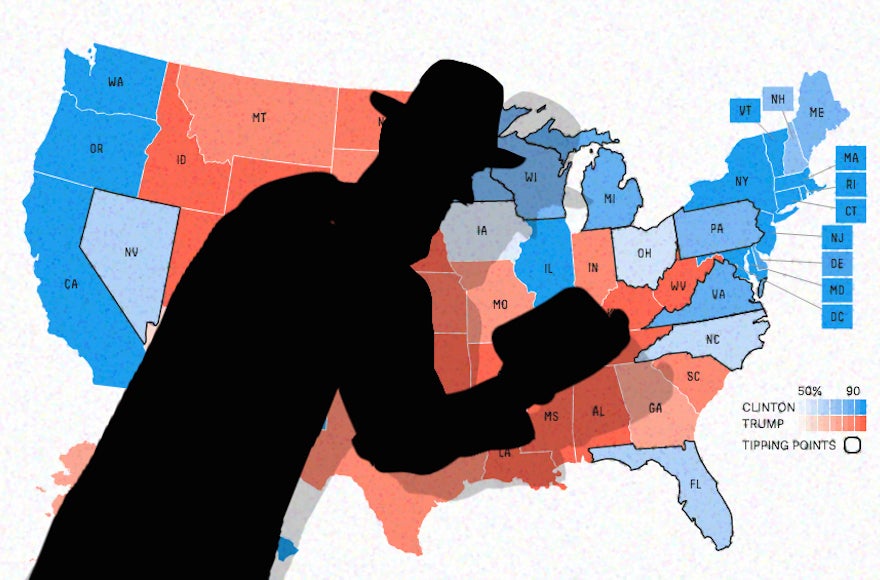Hear O Israel, the polls are up, the polls are down
Published October 7, 2016

(Lior Zaltzman)
In times of distress, Jews have always turned to prayer. Weighed down by our burdens and buoyed by our tradition, thrice daily we pause to connect with a Power Greater than Ourselves, seeking peace, solace and redemption. This age-old practice continues in our present day, where even the bedazzlement of digital technology and the promise of an infinitely interconnected world have not dimmed our need for meaning and answers to the big questions.
ADVERTISEMENT
And while such questions are not always answered, and that Power is often hidden from us, we have learned that there is at least an address for our supplications.
That address is FiveThirtyEight.com.
In these solemn weeks before we select a new sovereign to unite our holy nation — weeks traditionally known as the “Days of Awfulness” — millions of us renew our faith in Big Data as handed down by two Jewish prophets, one named Nate, the other named Harry. Just as the Holy One knows what’s in our hearts, FiveThirtyEight knows what’s in our polls. Who shall win, and who shall lose? Who shall be victorious in Florida and who shall be vanquished in Ohio? Who by gaffe, and who by chad? Who by scandal, and who by voter suppression?
These are the questions we are asking when we sittest in our house, and when we walkest by the way, when we liest down in bleary stupor after a town hall-style debate and when we riseth up in a cold sweat from a dream about being chased across an icy electoral map by Wolf Blitzer.
Although the House of FiveThirtyEight is diverse, its followers tend to abide by a number of similar rituals:
Prayer
Worshipers at the House of FiveThirtyEight turn to its wisdom at least three times a day: morning (presidential polls), afternoon (Senate) and evening (analysis). Each of the services has the following in common:
1. Chants of Winning, in which we point our browsers at FiveThirtyEight.com and collectively intone, “O website of Nate and Harry, hear our voice and tell us: Who emerged strongest out of the latest state-by-state polls? Can our candidate expect a post-debate bounce? And can you express that in a simple percentage that I can share with my friends on Facebook?”
ADVERTISEMENT
2. Hear O Index, in which we move our cursor along the interactive “odds of winning” bar graph and note with gratitude (or despair) how our candidate is doing compared to 24 hours ago. When performing the Hear O Index, it is customary to close one’s eyes and recite, “I can’t look, I can’t look….”
3. The Silent Prayer, in which we call in a whisper, or sometimes a barely suppressed scream, on the Lord of Hosts, HaKadosh Baruch Hu, the Virgin Mary, Krishna, Muhammed and anyone else who will listen to please, please, please pour out their wrath upon our enemy and make sure it doesn’t rain in Florida on Election Day. The Silent Prayer ends with the traditional formula, “May the One who causes peace to rule in the high heavens make life miserable for my neighbor with the ‘I’m not voting’ bumper sticker on her car.” Personal prayers for the withdrawal of Gary Johnson and Jill Stein may be inserted at this point.
Study
On Mondays and Thursdays we read portions of the Prophet Nate’s explanation of how his forecasts work. And while we humbly admit that our grasp of college-level statistics is weak, and that we don’t know Bayes’ Theorem from babke, we surrender our egos and submit to the knowledge that Nate and his disciples are wise in the ways of the algorithm.
Customs
There are few distinct rituals associated with the House of FiveThirtyEight, beyond the repeated refreshing of the web page and scoffing at friends who don’t consider social desirability bias and trend-line adjustments when sharing poll results (the fools!).
Some people prefer to worship with their fellows, and post happy poll results on their social media portals. Others prefer to meditate alone on that hour’s polls-plus results, and therein dwell on the imperfections of humankind, especially the sins of insufficient sample size and ignoring the margin of sampling error.
Yet no matter how we choose to worship, nor which candidate we prefer, we all take comfort from knowing that no matter what the polls do or don’t say, the presidential election campaign will one day come to an end.
And let us say, oy vey.














